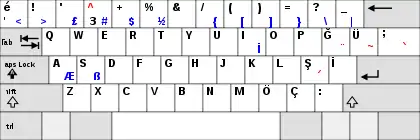Languages of Turkey
The languages of Turkey, apart from the official language Turkish, include the widespread Kurmanji, the moderately prevalent minority languages Arabic and Zazaki, and a number of less common minority languages, some of which are guaranteed by the 1923 Treaty of Lausanne.
| Languages of Turkey | |
|---|---|
| Official | Turkish |
| Minority | Kurdish (Kurmanji), Azerbaijani, Arabic, Zazaki, Pomak Bulgarian, Balkan Gagauz Turkish,[a] Laz, Armenian, Greek, Pontic Greek, Judaeo-Spanish |
| Immigrant | Adyghe, Albanian, Arabic, Bosnian, Crimean Tatar,[a] Georgian, Kabardian[1] (in alphabetical order) |
| Foreign | English (17%) German (4%) French (3%)[2] |
| Signed | Turkish Sign Language Mardin Sign Language |
| Keyboard layout | |
| a^ may be subsumed under the Turkish language. | |
| Part of a series on the |
| Culture of Turkey |
|---|
 |
| History |
| People |
| Languages |
| Cuisine |
| Festivals |
| Religion |
| Art |
| Literature |
| Sport |
|
Constitutional rights
Official language
Article 3 of the Constitution of Turkey defines Turkish as the official language of Turkey.[3]
Minority language rights
Article 42 of the Constitution explicitly prohibits educational institutions to teach any language other than Turkish as a mother tongue to Turkish citizens.[4]
No language other than Turkish shall be taught as a mother tongue to Turkish citizens at any institutions of training or education. Foreign languages to be taught in institutions of training and education and the rules to be followed by schools conducting training and education in a foreign language shall be determined by law. The provisions of international treaties are reserved.
— Art. 42, Constitution of the Republic of Turkey
Due to Article 42 and its longtime restrictive interpretation, ethnic minorities have been facing severe restrictions in the use of their mother languages.
Concerning the incompatibility of this provision with the International Bill of Human Rights, Turkey signed the International Covenants on Civil and Political Rights and on Economic, Social and Cultural Rights only with reservations constraining minority rights and the right to education. Furthermore, Turkey hasn't signed either of the Council of Europe's Framework Convention for the Protection of National Minorities, the European Charter for Regional or Minority Languages, or the anti-discrimination Protocol 12 to the European Convention on Human Rights.[5]
This particular constitutional provision has been contested both internationally and within Turkey. The provision has been criticized by minority groups, notably the Kurdish community. In October 2004, the Turkish State's Human Rights Advisory Board called for a constitutional review in order to bring Turkey's policy on minorities in line with international standards, but was effectively muted.[6] It was also criticized by EU member states, the OSCE, and international human rights organizations, including Human Rights Watch who observe that "the Turkish government accepts the language rights of the Jewish, Greek and Armenian minorities as being guaranteed by the 1923 Treaty of Lausanne. But the government claims that these are Turkey's only minorities, and that any talk of minority rights beyond this is just separatism".[7]
Supplementary language education
In 2012, the Ministry of Education included Kurdish (based on both Kurmanji and Zazaki dialects)[8] to the academic programme of the basic schools as optional classes from the fifth year on.[8]
Later, the Ministry of Education also included Abkhaz, Adyghe, Standard Georgian, and Laz languages in 2013, and Albanian as well as Bosnian languages in February 2017.[9]
In 2015, the Turkey’s Ministry of Education announced that as of the 2016-17 academic year, Arabic courses (as a second language) will be offered to students in elementary school starting in second grade. The Arabic courses will be offered as an elective language course like German, French and English. According to a prepared curriculum, second and third graders will start learning Arabic by listening-comprehension and speaking, while introduction to writing will join these skills in fourth grade and after fifth grade students will start learning the language in all its four basic skills.[10][11]
Lists of languages
The following table lists the mother tongues of people in Turkey by percentage of their speakers.
| Mother tongue | Percentage |
|---|---|
| Turkish | 84.54 |
| Northern Kurdish | 11.97 |
| Arabic | 1.38 |
| Zazaki | 1.01 |
| Other Turkic languages | 0.28 |
| Balkan languages | 0.23 |
| Laz | 0.12 |
| Circassian languages | 0.11 |
| Armenian | 0.07 |
| Other Caucasian languages | 0.07 |
| Greek | 0.06 |
| West European languages | 0.03 |
| Jewish languages | 0.01 |
| Coptic | 0.01 |
| Other | 0.12 |
Ethnologue lists many minority and immigrant languages in Turkey some of which are spoken by large numbers of people.
| Language | Dialect or variety | Speakers | Status (EGIDS)[a] | Notes |
|---|---|---|---|---|
| Turkish | 66,850,000 (2006) | 1 (National) | ||
| Kurdish | Northern Kurdish | 8,130,000 |
3 (Wider communication) | 3,000,000 monolinguals |
| Zazaki | Southern Zazaki | 1,500,000 |
5 (Developing) | |
| Northern Zazaki | 184,000 (2014) | 4 (Educational) | ||
| Arabic | North Levantine Arabic | 1,130,000 (2014) | 3 (Wider communication) | |
| Modern Standard Arabic | 686,000 (2015) | 4 (Educational) | Non-indigenous | |
| North Mesopotamian Arabic | 520,000 (2014) | 6a (Vigorous) | Do not read Arabic | |
| Other Mesopotamian Arabic | 101,000 (2014) | Non-indigenous | ||
| Kabardian | 1,000,000 (2005) | 5 (Developing) | Non-indigenous | |
| Azerbaijani | 540,000 (2014) | 5 (Dispersed) | ||
| Romani | Balkan Romani | 500,000 (1985) | 6a (Vigorous) | Non-indigenous |
| Domari | 8b (Nearly extinct) | |||
| Turkish Sign Language | 400,000 (1998) | 6a (Vigorous) | ||
| Bulgarian | Pomak Bulgarian | 351,000 (2014) | 5 (Dispersed) | |
| Balkan Gagauz Turkish | 327,000 (1993) | 7 (Shifting) | ||
| Adyghe | 316,000 (2014) | 5 (Dispersed) | Non-indigenous | |
| Greek | Pontic Greek | 5,000 (2009) | 7 (Shifting) | |
| Standard Modern Greek | 3,600 (2014) | 5 (Dispersed) | ||
| Georgian | 151,000 (2014) | 6b (Threatened) | ||
| Crimean Tatar | 100,000 (2014) | 5 (Developing) | Non-indigenous | |
| Albanian | Tosk Albanian | 66,000 (2014) | 6b (Threatened) | Non-indigenous |
| Gheg Albanian | 5 (Dispersed) | |||
| Armenian | 61,000 (2014) | 6b (Threatened) | ||
| Abkhaz | 44,000 (2014) | 6b (Threatened) | Non-indigenous | |
| Ossetian | Digor Ossetian | 37,000 (2014) | 5 (Developing) | Non-indigenous |
| Tatar | 5 (Dispersed) | Non-indigenous | ||
| Lazuri | 20,000 (2007) | 6b (Threatened) | ||
| Aramaic | Turoyo | 15,000 (2014) | 6b (Threatened) | |
| Hértevin | 1,000 (1999) | 6a (Vigorous) | ||
| Other Syriac varieties | 9 (Dormant) | |||
| Ladino | 13,000 (2007) | 7 (Shifting) | Non-indigenous | |
| Turkmen | 5 (Dispersed) | Non-indigenous | ||
| Bosnian | 4,500 (2013) | 6b (Threatened) | Non-indigenous | |
| Uzbek | Southern Uzbek | 3,800 (2014) | 5 (Dispersed) | Non-indigenous |
| Kyrgyz | 5 (Dispersed) | Non-indigenous | ||
| Uyghur | 5 (Dispersed) | Non-indigenous |
Not included in the report by Ethnologue is the Megleno-Romanian language, spoken by the Megleno-Romanians, who number around 5,000 in the country.[15]
a^ Expanded Graded Intergenerational Disruption Scale (EGIDS) of Ethnologue:
0 (International): "The language is widely used between nations in trade, knowledge exchange, and international policy."
1 (National): "The language is used in education, work, mass media, and government at the national level."
2 (Provincial): "The language is used in education, work, mass media, and government within major administrative subdivisions of a nation."
3 (Wider Communication): "The language is used in work and mass media without official status to transcend language differences across a region."
4 (Educational): "The language is in vigorous use, with standardization and literature being sustained through a widespread system of institutionally supported education."
5 (Developing): "The language is in vigorous use, with literature in a standardized form being used by some though this is not yet widespread or sustainable."
6a (Vigorous): "The language is used for face-to-face communication by all generations and the situation is sustainable."
6b (Threatened): "The language is used for face-to-face communication within all generations, but it is losing users."
7 (Shifting): "The child-bearing generation can use the language among themselves, but it is not being transmitted to children."
8a (Moribund): "The only remaining active users of the language are members of the grandparent generation and older."
8b (Nearly Extinct): "The only remaining users of the language are members of the grandparent generation or older who have little opportunity to use the language."
9 (Dormant): "The language serves as a reminder of heritage identity for an ethnic community, but no one has more than symbolic proficiency."
10 (Extinct): "The language is no longer used and no one retains a sense of ethnic identity associated with the language."
1965 Census
| Language | Mother tongue | Only language spoken | Second best language spoken |
|---|---|---|---|
| Abaza | 4,563 | 280 | 7,556 |
| Albanian | 12,832 | 1,075 | 39,613 |
| Arabic | 365,340 | 189,134 | 167,924 |
| Armenian | 33,094 | 1,022 | 22,260 |
| Bosnian | 17,627 | 2,345 | 34,892 |
| Bulgarian | 4,088 | 350 | 46,742 |
| Pomak | 23,138 | 2,776 | 34,234 |
| Chechen | 7,563 | 2,500 | 5,063 |
| Circassian | 58,339 | 6,409 | 48,621 |
| Croatian | 45 | 1 | 1,585 |
| Czech | 168 | 25 | 76 |
| Dutch | 366 | 23 | 219 |
| English | 27,841 | 21,766 | 139,867 |
| French | 3,302 | 398 | 96,879 |
| Georgian | 34,330 | 4,042 | 44,934 |
| German | 4,901 | 790 | 35,704 |
| Greek | 48,096 | 3,203 | 78,941 |
| Italian | 2,926 | 267 | 3,861 |
| Kurdish (Kurmanji) | 2,219,502 | 1,323,690 | 429,168 |
| Judæo-Spanish | 9,981 | 283 | 3,510 |
| Laz | 26,007 | 3,943 | 55,158 |
| Persian | 948 | 72 | 2,103 |
| Polish | 110 | 20 | 377 |
| Portuguese | 52 | 5 | 3,233 |
| Romanian | 406 | 53 | 6,909 |
| Russian | 1,088 | 284 | 4,530 |
| Serbian | 6,599 | 776 | 58,802 |
| Spanish | 2,791 | 138 | 4,297 |
| Turkish | 28,289,680 | 26,925,649 | 1,387,139 |
| Zaza | 150,644 | 92,288 | 20,413 |
| Total | 31,009,934 | 28,583,607 | 2,786,610 |
| Province / Language | Turkish | Kurdish | Arabic | Zazaki | Circassian | Greek | Georgian | Armenian | Laz | Pomak | Bosnian | Albanian | Jewish |
|---|---|---|---|---|---|---|---|---|---|---|---|---|---|
| Adana (including Osmaniye) | 866,316 | 7,581 | 22,356 | 332 | 51 | 51 | 0 | 28 | 9 | 0 | 312 | 483 | 29 |
| Adıyaman | 143,054 | 117,325 | 7 | 6,705 | 0 | 0 | 0 | 84 | 4 | 0 | 0 | 0 | 0 |
| Afyonkarahisar | 499,461 | 125 | 19 | 1 | 2,172 | 169 | 2 | 2 | 1 | 16 | 14 | 2 | 1 |
| Ağrı | 90,021 | 156,316 | 105 | 4 | 2 | 2 | 77 | 5 | 0 | 1 | 103 | 0 | 0 |
| Amasya | 279,978 | 2,179 | 9 | 2 | 1,497 | 6 | 1,378 | 208 | 6 | 0 | 10 | 336 | 1 |
| Ankara (including Kırıkkale) | 1,590,392 | 36,798 | 814 | 21 | 393 | 124 | 41 | 66 | 120 | 7 | 126 | 833 | 64 |
| Antalya | 486,697 | 23 | 2 | 0 | 0 | 14 | 0 | 0 | 2 | 0 | 0 | 1 | 0 |
| Artvin | 190,183 | 46 | 4 | 0 | 0 | 4 | 7,698 | 1 | 12,093 | 1 | 1 | 0 | 0 |
| Aydın | 523,583 | 168 | 85 | 0 | 112 | 71 | 4 | 1 | 4 | 0 | 26 | 88 | 0 |
| Balıkesir | 698,679 | 560 | 38 | 8 | 3,144 | 236 | 1,273 | 9 | 205 | 1,707 | 314 | 24 | 4 |
| Bilecik | 137,674 | 5 | 4 | 0 | 736 | 4 | 73 | 1 | 1 | 2 | 6 | 3 | 0 |
| Bingöl | 62,668 | 56,881 | 19 | 30,878 | 17 | 0 | 1 | 11 | 1 | 0 | 0 | 0 | 3 |
| Bitlis | 56,161 | 92,327 | 3,263 | 2,082 | 205 | 1 | 5 | 16 | 0 | 0 | 0 | 1 | 2 |
| Bolu (including parts of Düzce) | 375,786 | 363 | 0 | 0 | 1,593 | 3 | 1,541 | 488 | 1,791 | 0 | 40 | 6 | 1 |
| Burdur | 194,910 | 2 | 7 | 0 | 0 | 3 | 12 | 0 | 0 | 0 | 0 | 1 | 0 |
| Bursa | 746,633 | 213 | 22 | 0 | 799 | 106 | 2,938 | 35 | 517 | 65 | 1,169 | 1,928 | 69 |
| Çanakkale | 338,379 | 443 | 0 | 25 | 1,604 | 5,258 | 4 | 9 | 12 | 3,675 | 516 | 6 | 121 |
| Çankırı (including parts of Karabük) | 250,510 | 158 | 1 | 0 | 0 | 1 | 0 | 3 | 2 | 0 | 0 | 0 | 0 |
| Çorum | 474,638 | 8,736 | 4 | 0 | 1,808 | 12 | 8 | 51 | 3 | 7 | 0 | 0 | 0 |
| Denizli | 462,860 | 283 | 28 | 5 | 8 | 97 | 1 | 1 | 0 | 2 | 1 | 3 | 0 |
| Diyarbakır | 178,644 | 236,113 | 2,536 | 57,693 | 1 | 1 | 3 | 134 | 3 | 48 | 1 | 5 | 0 |
| Edirne | 290,610 | 386 | 104 | 21 | 9 | 18 | 2 | 12 | 3 | 10,285 | 329 | 58 | 92 |
| Elazığ | 244,016 | 47,446 | 17 | 30,921 | 0 | 2 | 0 | 2 | 30 | 12 | 3 | 2 | 0 |
| Erzincan | 243,911 | 14,323 | 13 | 298 | 4 | 5 | 0 | 12 | 2 | 3 | 0 | 1 | 0 |
| Erzurum | 555,632 | 69,648 | 86 | 2,185 | 109 | 8 | 4 | 11 | 24 | 7 | 1 | 5 | 1 |
| Eskişehir | 406,212 | 327 | 42 | 0 | 1,390 | 4 | 3 | 0 | 14 | 23 | 114 | 78 | 0 |
| Gaziantep | 490,046 | 18,954 | 885 | 1 | 4 | 6 | 0 | 4 | 3 | 0 | 1 | 11 | 0 |
| Giresun | 425,665 | 305 | 1 | 1 | 2 | 0 | 2,029 | 0 | 5 | 0 | 0 | 0 | 0 |
| Gümüşhane (including Bayburt) | 260,419 | 2,189 | 0 | 0 | 91 | 0 | 0 | 0 | 17 | 0 | 0 | 0 | 0 |
| Hakkari (including parts of Şırnak) | 10,357 | 72,365 | 165 | 0 | 1 | 0 | 1 | 21 | 2 | 0 | 0 | 0 | 0 |
| Hatay | 350,080 | 5,695 | 127,072 | 7 | 780 | 767 | 11 | 376 | 6 | 2 | 8 | 44 | 1 |
| Isparta | 265,305 | 688 | 75 | 11 | 8 | 91 | 0 | 1 | 2 | 1 | 1 | 3 | 4 |
| Mersin | 500,207 | 1,067 | 9,430 | 23 | 76 | 137 | 13 | 12 | 19 | 3 | 3 | 9 | 1 |
| İstanbul | 2,185,741 | 2,586 | 2,843 | 26 | 317 | 35,097 | 849 | 29,479 | 128 | 165 | 3,072 | 4,341 | 8,608 |
| İzmir | 1,214,219 | 863 | 352 | 5 | 1,287 | 898 | 15 | 17 | 15 | 1,289 | 2,349 | 1,265 | 753 |
| Kars (including Ardahan and Iğdır) | 471,287 | 133,144 | 61 | 992 | 215 | 6 | 8 | 5 | 24 | 1 | 5 | 4 | 1 |
| Kastamonu (including parts of Düzce) | 439,355 | 1,090 | 2 | 0 | 3 | 2 | 180 | 849 | 1 | 0 | 0 | 0 | 0 |
| Kayseri | 509,932 | 8,454 | 34 | 8 | 17,110 | 1 | 1 | 9 | 6 | 9 | 15 | 160 | 1 |
| Kırklareli | 252,594 | 602 | 136 | 24 | 5 | 3 | 5 | 3 | 7 | 3,375 | 1,148 | 144 | 11 |
| Kırşehir | 185,489 | 11,309 | 4 | 0 | 2 | 0 | 0 | 0 | 1 | 0 | 1 | 0 | 0 |
| Kocaeli | 320,808 | 235 | 0 | 10 | 1,467 | 63 | 2,755 | 46 | 2,264 | 381 | 3,827 | 22 | 7 |
| Konya (including Karaman) | 1,092,819 | 27,811 | 67 | 4 | 1,139 | 3 | 7 | 1 | 5 | 1 | 11 | 75 | 0 |
| Kütahya | 397,221 | 105 | 13 | 2 | 17 | 4 | 2 | 88 | 9 | 0 | 0 | 34 | 0 |
| Malatya | 374,449 | 77,794 | 33 | 10 | 14 | 5 | 7 | 148 | 5 | 4 | 0 | 3 | 0 |
| Manisa | 746,514 | 241 | 15 | 0 | 488 | 42 | 67 | 2 | 6 | 54 | 116 | 192 | 3 |
| Kahramanmaraş | 386,010 | 46,548 | 21 | 0 | 4,185 | 0 | 0 | 13 | 3 | 0 | 0 | 9 | 0 |
| Mardin (including parts of Batman) | 35,494 | 265,328 | 79,687 | 60 | 75 | 11 | 15 | 11 | 0 | 0 | 1 | 6 | 0 |
| Muğla | 334,883 | 6 | 4 | 1 | 0 | 28 | 0 | 0 | 0 | 1 | 0 | 0 | 4 |
| Muş | 110,555 | 83,020 | 3,575 | 507 | 898 | 0 | 1 | 3 | 103 | 0 | 0 | 0 | 0 |
| Nevşehir | 203,156 | 22 | 0 | 0 | 0 | 0 | 0 | 0 | 0 | 0 | 0 | 22 | 0 |
| Niğde (including Aksaray) | 353,146 | 8,991 | 10 | 0 | 227 | 5 | 0 | 12 | 4 | 0 | 15 | 4 | 0 |
| Ordu | 538,978 | 12 | 0 | 0 | 5 | 0 | 4,815 | 34 | 0 | 1 | 0 | 1 | 0 |
| Rize | 275,291 | 11 | 1 | 1 | 0 | 9 | 4 | 0 | 5,754 | 1 | 0 | 1 | 0 |
| Sakarya | 388,481 | 2,163 | 32 | 3 | 538 | 6 | 4,535 | 2 | 2,671 | 23 | 2,899 | 794 | 1 |
| Samsun | 747,115 | 1,366 | 3 | 0 | 3,401 | 91 | 2,350 | 5 | 51 | 319 | 10 | 610 | 0 |
| Siirt (including parts of Batman and parts of Şırnak) | 46,722 | 179,023 | 38,273 | 484 | 1 | 0 | 15 | 98 | 3 | 0 | 10 | 0 | 0 |
| Sinop | 261,341 | 2,126 | 0 | 0 | 659 | 1 | 1,144 | 228 | 3 | 5 | 0 | 7 | 3 |
| Sivas | 649,099 | 32,284 | 19 | 23 | 2,086 | 0 | 0 | 217 | 1 | 0 | 515 | 0 | 0 |
| Tekirdağ | 284,222 | 548 | 76 | 18 | 5 | 19 | 52 | 8 | 2 | 1,627 | 6 | 51 | 102 |
| Tokat | 483,948 | 3,974 | 7 | 3 | 5,934 | 0 | 367 | 45 | 2 | 0 | 0 | 964 | 0 |
| Trabzon | 590,799 | 72 | 12 | 0 | 0 | 4,535 | 1 | 11 | 0 | 0 | 0 | 0 | 0 |
| Tunceli | 120,553 | 33,431 | 20 | 2,370 | 28 | 0 | 0 | 4 | 0 | 18 | 10 | 8 | 0 |
| Şanlıurfa | 207,652 | 175,100 | 51,090 | 14,554 | 3 | 0 | 5 | 2 | 4 | 0 | 2 | 0 | 0 |
| Uşak | 190,506 | 16 | 2 | 0 | 1 | 0 | 0 | 4 | 1 | 0 | 0 | 0 | 0 |
| Van | 118,481 | 147,694 | 557 | 3 | 1 | 2 | 1 | 1 | 8 | 0 | 1 | 1 | 66 |
| Yozgat | 433,385 | 2,424 | 1 | 0 | 1,597 | 2 | 0 | 118 | 0 | 0 | 14 | 1 | 0 |
| Zonguldak (including Bartın and parts of Karabük) | 649,757 | 43 | 26 | 0 | 5 | 17 | 2 | 3 | 15 | 0 | 1 | 1 | 1 |
Provinces with Turkish speakers in majority Provinces with Turkish speakers in plurality Provinces with Kurdish speakers in plurality Provinces with Kurdish speakers in majority
 Turkish- and Kurdish-speaking pluralities
Turkish- and Kurdish-speaking pluralities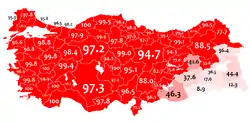 Turkish-speaking population
Turkish-speaking population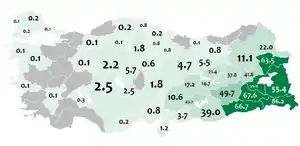 Kurdish-speaking population
Kurdish-speaking population Arabic-speaking population
Arabic-speaking population Zaza-speaking population
Zaza-speaking population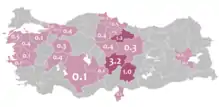 Circassian-speaking population
Circassian-speaking population Greek-speaking population
Greek-speaking population Armenian-speaking population
Armenian-speaking population Georgian-speaking population
Georgian-speaking population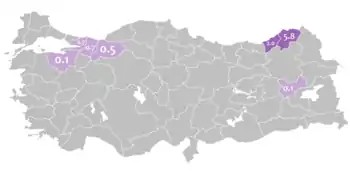 Laz-speaking population
Laz-speaking population Pomak-speaking population
Pomak-speaking population Bosnian-speaking population
Bosnian-speaking population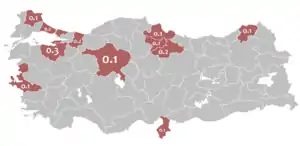 Albanian-speaking population
Albanian-speaking population Hebrew-speaking population
Hebrew-speaking population
History

Turkey has historically been the home to many now extinct languages. These include Hittite, the earliest Indo-European language for which written evidence exists (circa 1600 BCE to 1100 BCE when the Hittite Empire existed). The other Anatolian languages included Luwian and later Lycian, Lydian and Milyan. All these languages are believed to have become extinct at the latest around the 1st century BCE due to the Hellenization of Anatolia which led to Greek in a variety of dialects becoming the common language.
Urartian belonging to the Hurro-Urartian language family existed in eastern Anatolia around Lake Van. It existed as the language of the kingdom of Urartu from about the 9th century BCE until the 6th century. Hattian is attested in Hittite ritual texts but is not related to the Hittite language or to any other known language; it dates from the 2nd millennium BCE.
In the post-Tanzimat period French became a common language among educated people, even though no ethnic group in the empire natively spoke French.[18] Johann Strauss, author of "Language and power in the late Ottoman Empire," wrote that "In a way reminiscent of English in the contemporary world, French was almost omnipresent in the Ottoman lands."[19] Strauss also stated that French was "a sort of semi-official language",[20] which "to some extent" had "replaced Turkish as an 'official' language for non-Muslims".[21] Therefore late empire had multiple French-language publications, and several continued to operate when the Republic of Turkey was declared in 1923. However French-language publications began to close in the 1930s.[22]
References
- Refugees, United Nations High Commissioner for. "Refworld - World Directory of Minorities and Indigenous Peoples - Turkey"., [[Kurdish language|Kurdish]
- Europeans and Their Languages
- "Constitution of the Republic of Turkey". Republic of Turkey. . Missing or empty
|url=(help) - "Constitution of the Republic of Turkey". Republic of Turkey. . Missing or empty
|url=(help) - European Commission 2005, pp. 35 f..
- European Commission 2005, p. 35.
- Questions and Answers: Freedom of Expression and Language Rights in Turkey. New York: Human Rights Watch. April 2002.
- "Kürtçe İlk Kez Müfredata Girdi" [Kurdish Is on the Academic Programme for the First Time]. Hürriyet Eğitim. Milliyet.com.tr (in Turkish). Milliyet. 12 September 2012.
- "Boşnakça ve Arnavutça Müfredata Girdi" [Bosnian and Albanian Languages Are on the Academic Programme]. Hürriyet Eğitim. Hurriyet.com.tr (in Turkish). Hürriyet. 23 February 2017.
- Al-Monitor: Turks divided over plans to introduce Arabic-language teaching, 2 November 2015, Retrieved 29 December 2017.
- Hürriyet Daily News: Arabic to be offered as second language in Turkish elementary schools, 23 October 2015, Retrieved 29 December 2017.
- "Etnik Kimlikler: Anadil [Ethnic Identitites: Mother Tongue]". Toplumsal Yapı Araştırması 2006 [Social Structure Research 2006] (PDF) (Report). KONDA. September 2006. p. 19. Archived from the original (PDF) on 2017-02-15. Retrieved 2016-04-24.
- Lewis, M. Paul (ed.) (2009). "Ethnologue report for Turkey (Europe)". Ethnologue: Languages of the World. SIL International. Archived from the original on 2010-07-07. Retrieved 2009-09-08.CS1 maint: extra text: authors list (link)
- Lewis, M. Paul (ed.) (2009). "Ethnologue report for Turkey (Asia)". Ethnologue: Languages of the World. SIL International. Archived from the original on 2010-07-07. Retrieved 2009-09-08.CS1 maint: extra text: authors list (link)
- Kahl, Thede (2006). "The Islamisation of the Meglen Vlachs (Megleno-Romanians): The Village of Nânti (Nótia) and the "Nântinets" in Present-Day Turkey". Nationalities Papers. 34 (1). pp. 71–90. doi:10.1080/00905990500504871.
- Heinz Kloss & Grant McConnel, Linguistic composition of the nations of the world, vol,5, Europe and USSR, Québec, Presses de l'Université Laval, 1984, ISBN 2-7637-7044-4
- Ahmet Buran Ph.D., Türkiye'de Diller ve Etnik Gruplar, 2012
- Strauss, Johann (2010). "A Constitution for a Multilingual Empire: Translations of the Kanun-ı Esasi and Other Official Texts into Minority Languages". In Herzog, Christoph; Malek Sharif (eds.). The First Ottoman Experiment in Democracy. Wurzburg: Orient-Institut Istanbul. pp. 21–51. (info page on book at Martin Luther University) // CITED: p. 26 (PDF p. 28): "French had become a sort of semi-official language in the Ottoman Empire in the wake of the Tanzimat reforms.[...]It is true that French was not an ethnic language of the Ottoman Empire. But it was the only Western language which would become increasingly widespread among educated persons in all linguistic communities."
- Strauss, Johann (2016-07-07). "Language and power in the late Ottoman Empire". In Murphey, Rhoads (ed.). Imperial Lineages and Legacies in the Eastern Mediterranean: Recording the Imprint of Roman, Byzantine and Ottoman Rule. Routledge. (ISBN 1317118456, 9781317118459), p. 122.
- Strauss, Johann (2016-07-07). "Language and power in the late Ottoman Empire". In Murphey, Rhoads (ed.). Imperial Lineages and Legacies in the Eastern Mediterranean: Recording the Imprint of Roman, Byzantine and Ottoman Rule. Routledge. (ISBN 1317118448, 9781317118442), Google Books PT192.
- Strauss, Johann (2016-07-07). "Language and power in the late Ottoman Empire". In Murphey, Rhoads (ed.). Imperial Lineages and Legacies in the Eastern Mediterranean: Recording the Imprint of Roman, Byzantine and Ottoman Rule. Routledge. (ISBN 1317118448, 9781317118442), Google Books PT193.
- Tanatar Baruh, Lorans; Sara Yontan Musnik. "Francophone press in the Ottoman Empire". French National Library. Retrieved 2019-07-13.
Further reading
| Wikimedia Commons has media related to Languages of Turkey. |
- European Commission, ed. (2005-11-09). "Turkey 2005 Progress Report".
- Turgut, Üveys Mücahit (May 2007). "A CONCEPTUAL HISTORY OF ULUS IN THE CONTEXT OF NATION-BUILDING AND LANGUAGE POLICIES IN TURKEY" (PDF). - Thesis submitted to Istanbul Sehir University
